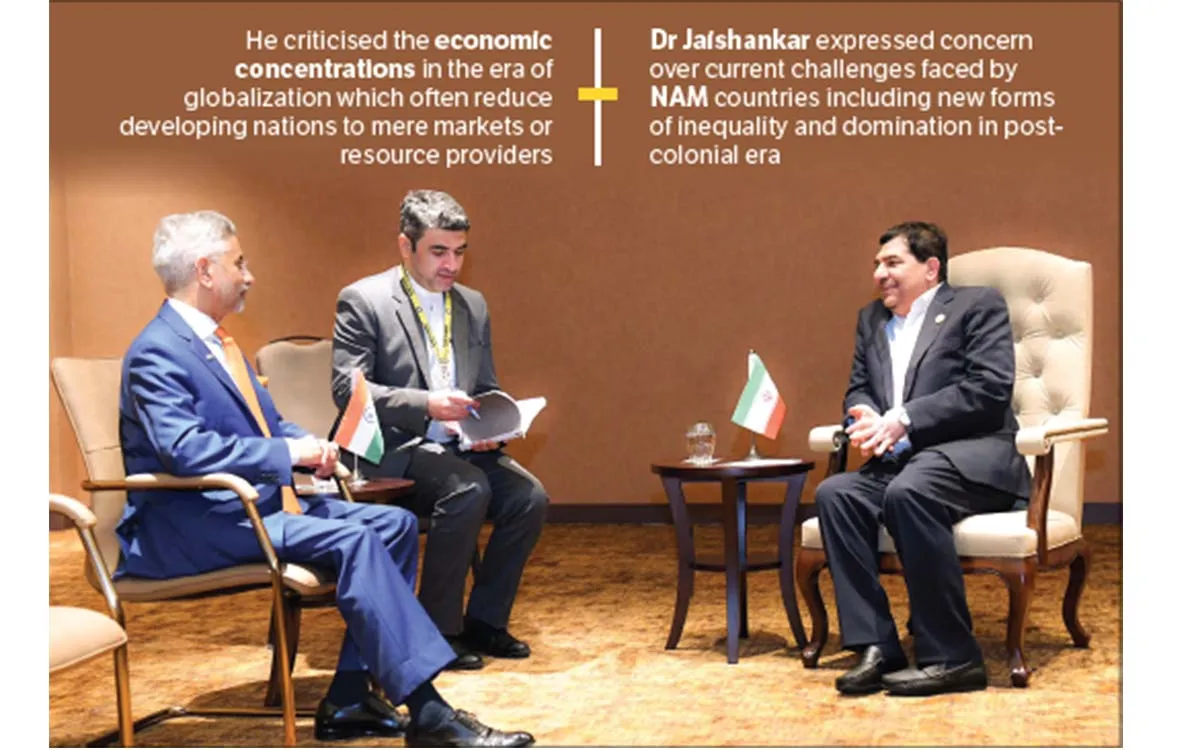New Delhi, Jan 20: As the Non-Aligned Movement (NAM) celebrates its seventh decade, the Indian Minister of External Affairs, Dr. S. Jaishankar, emphasised the need for greater assertiveness and collaboration among member nations at the 19th NAM Summit in Kampala, Uganda.
He highlighted the transformed global landscape and the increased capabilities and confidence of NAM countries, urging them to be more proactive in asserting their interests and demands. Dr Jaishankar’s concluding remarks at the summit stressed the enduring and growing relevance of NAM’s voice in international affairs.
Challenges and Practical Solutions
Dr Jaishankar expressed concern over current challenges faced by NAM countries, including new forms of inequality and domination in the post-colonial era.
He critiqued the economic concentrations in the era of globalization, which often reduced developing nations to mere markets or resource providers. The COVID-19 pandemic underscored these vulnerabilities, revealing the dependence on distant manufacturing for basic needs and the imposition of narratives that overlook diverse cultural and traditional values.
To counter these challenges, Dr Jaishankar advocated for a multipolar world centred around a reformed United Nations, emphasizing economic decentralization with regional production and a call for cultural rebalancing to ensure mutual respect for all heritage.
He cited India’s leadership in integrating the African Union into the G20 as evidence of the potential for change and the need for reformed multilateralism.
Dr Jaishankar outlined a series of practical steps for transforming the world order, including the creation of regional economic hubs, resilient supply chains, and policies centred on sustainable lifestyles and digital infrastructure.
He underscored the importance of addressing food, energy, and health security, women-led development, and prioritizing connectivity while respecting sovereignty. He also emphasized the need for adequate resources for climate action and achieving Sustainable Development Goals (SDGs).
India’s Global Development Projects, Vaccine Diplomacy, and G20 Initiatives
Highlighting India’s commitment to these ideals, Dr. Jaishankar mentioned the implementation of 600 significant projects across 78 nations, all respecting partner choices, and India’s extensive support to Africa.
He also noted India’s response during the COVID-19 pandemic, providing vaccines to over 100 nations while vaccinating its population, and its role as a first responder to natural disasters in the developing world.
As chair of the G20, India focused on drawing strength from the Global South, reaffirming its position as a ‘Vishwa Mitra’ or friend of the world.
Calls for Peace and Resolution in Gaza and Advocates for Two-State Solution
Dr Jaishankar underscored the necessity of peace and stability for growth and progress in a globalized world, pointing out the far-reaching impacts of conflicts, such as the Ukraine crisis affecting fuel, food, and fertilizer supplies. He called for a sustainable solution to the humanitarian crisis in Gaza, condemning terrorism and hostage-taking while stressing the respect for international humanitarian law by all states. He advocated for a two-state solution for the Palestinian people, living within secure borders, as a focus for collective efforts.
In conclusion, Dr. Jaishankar applauded Uganda for assuming the Chairship of NAM at a critical time, recognizing Azerbaijan’s leadership during challenging periods and welcoming South Sudan as a new member.
Reflecting on the profound changes since the last NAM meeting in Baku in 2019, he remarked on the global impact of the COVID-19 pandemic, ongoing conflicts, climate change disruptions, and economic challenges, emphasizing the belief in ‘Vasudhaiva Kutumbakam’ or ‘the world as a family’, guiding India’s approach to these issues.







